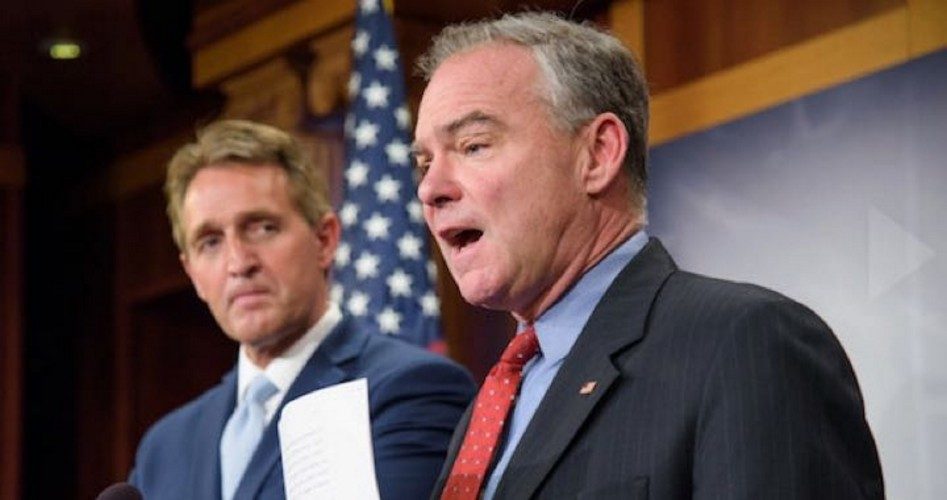
Senator Tim Kaine (D-Va.), shown on right, says he’s “very concerned” that President Donald Trump will order military strikes against Syria while lacking the “legal authority to wage war.”
In a Tuesday interview with MSNBC’s Morning Joe, Kaine, who sits on the Senate Foreign Relations and Armed Services committees, told Mike Barnicle, “The president currently does not have any legal authority to wage war against nation-states, missile strikes against Syria, for example, without coming to Congress.”
The 2001 Authorization for the Use of Military Force (AUMF) is by now insufficient justification for military action against other nation-states or even against many non-state actors such as ISIS, Kaine averred. Senate Foreign Relations Committee Chairman Bob Corker (R-Tenn.) has announced that the committee will take up a revision to the AUMF to address some of these issues, Kaine said, adding, “I have been working very significantly with Senator Corker to try to come up with a proposal that will limit — rewrite and limit — the 2001 authorization and put more constraints on the when, where, and who we are fighting against.”
“That 2001 authorization is a complete blank check to the president,” he declared, “and it’s long past time that we impose some reasonable limitations.”
Although one might suspect Kaine of mere partisan sniping — he was, after all, Hillary Clinton’s running mate in her 2016 presidential campaign — the fact is that despite his far-from-constitutional voting record, he has consistently spoken out against presidential war-making regardless of the commander-in-chief’s political party.
As far back as 2013, when Barack Obama was president, Kaine was sounding alarm bells about possible U.S. incursions into Syria’s civil war. During an Armed Services Committee hearing in which a Pentagon attorney claimed the 2001 AUMF gives the president virtually unlimited authority to intervene in foreign countries, Kaine stated, “The testimony I hear today suggests the administration believes that they would have the authority to go into Syria. But I don’t want us to walk out of the room leaving an impression that members of Congress also share the understanding that that would be acceptable.”
Nevertheless, the next year, Obama ordered the armed forces into Syria ostensibly to defend the U.S. consulate in Erbil and to protect the Kurds in northern Iraq — and then kept them there long after the alleged crisis had passed.
In October 2015, Kaine said, “There was a self-defense rationale that allowed [Obama] to start [military activity] without Congress. But within two weeks, the protect-the-Americans side of this was done, and at that point, the president’s legal authority, in my view, expired.”
“And,” he argued, “you can’t go on an offensive war without Congress,” though Obama had done just that, not even bothering to request authorization until six months after he had already committed troops. Kaine didn’t spare his fellow lawmakers, however, saying, “It’s Congress’s authority to declare war, and they haven’t been willing to take this up for 15 months. So there is a lot of blame to be going around.”
None of this is to suggest that Kaine is against military action in Syria. In fact, he told Barnicle, “I voted in August of 2014 that the United States should take military action against Syria for gassing its own citizens” — an allegation that has proven ever more tenuous over time. “There needs to be a consequence for that,” he continued, “but it can’t be the president just deciding on his own without Congress.”
Just as he had cautioned in 2015 that Obama’s unilateral involvement in Syria might lead to “something more significant,” Kaine warned Tuesday, “If we let President Trump unilaterally initiate a military campaign against Syria, what’s to stop him from doing it against North Korea or Iran or some other nation, particularly when he’s so stressed out and rambling and worried about domestic investigation into the legitimacy of his presidency?”
Indeed, Congress’ unwillingness to enforce its constitutional prerogative to declare war — or not — has emboldened presidents since Harry Truman to embroil the United States in conflicts the world over, often to the detriment of both America and the countries in which it has intervened.
“Congress,” Kaine told Barnicle, “needs to quit acting like an Article Two-and-a-half branch and start acting like an Article One branch again.”
Photo of Tim Kaine: Senate.gov



